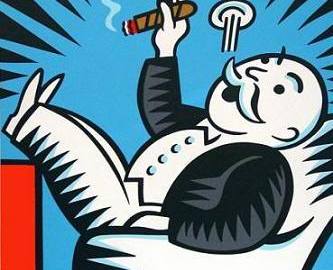Amazon Publishing Leaps Forward; HarperCollins Smells a Monopoly

For Amazon, a publishing program is the next logical step in its long-term business strategy. For the rest of the book industry, it’s cause for a bad case of nerves. Amazon’s announcement this past week that it would be publishing its first major title—The 4-Hour Chef, by self-help maven Tim Ferriss—had the chief executive of HarperCollins UK worrying aloud in the New York Times: “[Amazon is] very, very powerful now, and in fact they are getting close to being in a monopolistic situation.”
I think a monopoly is unlikely, although I wouldn’t bet a hundred per cent against it. This I will predict: if it forms, you’ll see an intense backlash against the company. Some of it will come from publishing industry professionals, including those who are struggling at the bottom of the ladder. (The Columbia Publishing Course, a condensed graduate program for publishing job-seekers, saw a major spike in applicants this year despite dismal industry-wide hiring and salary prospects.) A lot of it will come from authors, a profession for which there is now a massive oversupply of eager labor. (The number of degree-granting U.S. creative writing programs has risen from 79 to 854 in the last 35 years, and their students and alumni account for just a fraction of authors across a few specific genres.)
If Amazon were to gain a stranglehold over bookselling and publishing, jobs and avenues to publication would decrease further, and competition for both would become even more cutthroat than it already is. The result would be tremendous ill will from the literary community, especially if the company engaged in monopolistic practices: chiseling authors on advances and royalties, gouging consumers on prices, and so on.
Again, though, this is all a doomsday scenario. There’s nothing inherently evil or unnatural about Amazon Publishing; at this stage in their company’s growth, they’d be crazy not to attempt such a program. And at least as far as publishing goes, an oligopoly scenario seems more plausible: if the program flourishes, some combination of Google, Apple, and Facebook will probably attempt similar ventures of their own. (Google has already shown a keen interest in digital book content, Apple already poses stiff competition on the e-reader front, and Facebook just acquired Push Pop Press…) A publishing industry dominated by a handful of giant tech companies would still be less than ideal, but it would prevent the one company from acting with impunity.
The Times also quotes literary agent Richard Curtis as offering a less dramatic prediction: “There is lots of conventional business being done by conventional publishers on conventional terms, and the books are being published on conventional paper with conventional royalties. What we’ll see for a long time is an amalgam of the two approaches, digital and traditional.” I think he’s right, although I’d add that this amalgam may involve some acquisitions of traditional by digital companies.
The Ferriss deal signals that Amazon is once again moving shrewdly to diversify and consolidate power. It’s pointless to panic, or to resent them for it. I just hope they’ll treat the industry they rule in the same way you’d handle a precious antique book—respectfully, and without breaking its spine.
[Image via Photobucket; Monopoly and the Monopoly man character are trademarks of Hasbro, Inc.]





